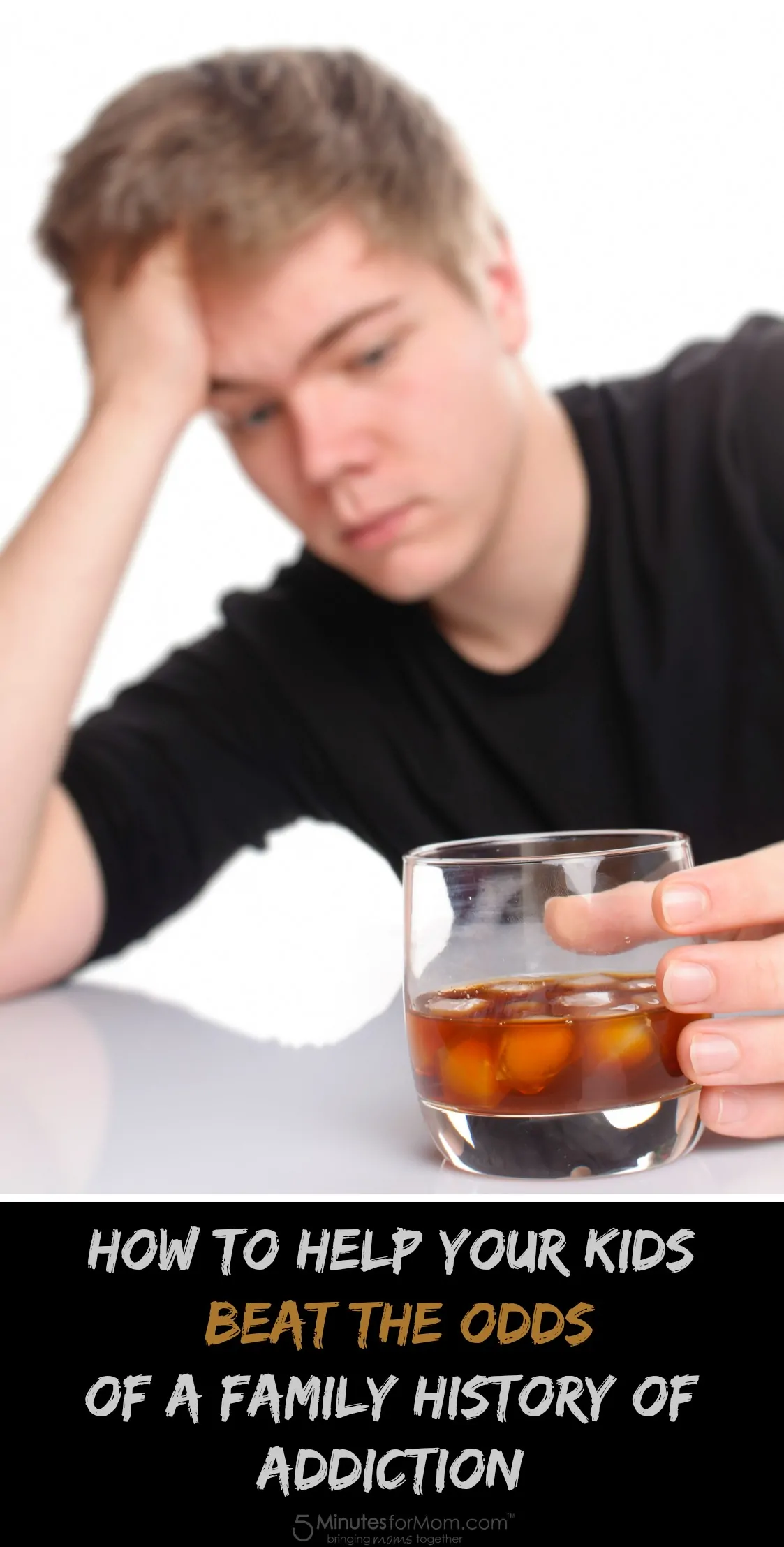This post may contain affiliate links. Read my disclosure policy here.
As parents there are certain topics we don’t look forward to having to discuss with our kids. Warning your children about the dangers of drinking and using illegal drugs is definitely one of those hard-to-have conversations.
But it’s also one of the most important… and one that you need to have over and over again. In this post, I share a look into my past and the lessons I learned about how to beat the odds of a family history of addiction.
3 out of my 4 grandparents were alcoholics.
I never met those 3.
But they have heavily influenced my life and my decisions regarding drinking and drugs.
Early in my teen years, my mom explained to me how alcoholism ran in both sides of my family and that meant I had to be extra careful about drinking.
Understanding My Family History
From what I can gather, depression likely led to the drinking for all three of them. And in fact, my father’s mother actually committed suicide.
I never found out very much about my father’s father. From what I know, he was an outgoing, rather successful local businessman immigrant from Finland. I think he was a big social drinker and an alcoholic.
But my father didn’t get to know him very well as he died when my father was about 6 years old. After my father’s death from a brain aneurysm about 15 years ago, we figured out that the early deaths on my father’s side were likely all from hereditary brain aneurysms. (Yes, it scares me… and I need to book another scan soon.)
My father’s mother got remarried to the man I would know later as “Grandpa”.
I think they both drank a fair amount of Vodka and homemade wine… which was rather common for Finnish immigrants. And eventually my father’s mother killed herself — about 5 years before I was born.
My mom’s dad was an alcoholic too… but he was a quiet man who drank in solitude. I’ll never know the reasons that he drank as he died long before I was born — likely because of health complications from drinking.
I grew up trying to imagine what caused my grandparents to drink and if they had had help to stop, if they would have had better lives.
Knowing that depression and addiction run in my family, I took my mental health and my behaviour very seriously.
Breaking the Family History of Addiction
Now that I’m a mother of two girls, I often try to figure out what my parents did right in raising me and my siblings so that none of us ever fell victim to alcoholism or any other addiction.
Here’s what I think helps break the cycle of a family history with addiction.
- Talk about it.
The most important way to help your kids avoid a problem with drugs or alcohol is to talk about it ahead of time. Talk with your kids about all aspects of drugs and alcohol far before they are likely to encounter it on their own.
My girls are 8 and 10, and I’ve already talked to them many times about the dangers of drinking and drugs.
Be honest about your family history.
It may seem strange to tell your children that their grandparents were alcoholics, but they need to know.
Knowing that addiction ran in both sides of my family history and how devastating the impact was on my parents was the biggest factor in me avoiding alcohol and drugs in my teens and twenties.
I can honestly say, that I have never been drunk and I’ve never tried any illegal drug.
Had I never known how seriously alcoholism affected my grandparents, perhaps I would have been more lenient and drank more in my younger days.
Now as an adult, I do enjoy drinks socially but I’ll always be careful to never let myself fall into a pattern of finding relief from alcohol.
- Ensure depression, anxiety or other mood or food disorders are treated professionally.
If my depression and anxiety had not been properly diagnosed and treated professionally by a psychiatrist, I have no doubt I would have found some way to self-medicate with alcohol.
Depression and other mental illnesses are hereditary. I believe my grandparents who were alcoholics struggled with depression. And in those days, certainly nobody would have talked about such struggles.
If mental illness runs in your family, ensure you watch for symptoms in your children and get them help as early as possible.
Taking medication for depression or anxiety does not make you “addicted” to that medication. If you have any concerns about your child taking medication, please talk to a doctor and get the information you need.
- Everyone can benefit from counselling.
I’m such a fan of therapy.
No family is perfect and every childhood has struggles that can cause damage if not properly addressed. I’m thankful that I’ve benefited from many different counsellors throughout my life.
Every marriage can be improved with some counselling and families together can have sessions that help everyone.
If your child or teenager seems at all depressed or struggling with the difficulties of growing up, consider having them chat with a therapist.
Through counselling sessions, I learned so much about myself and my family as well as coping strategies for my depression and anxiety.
- Model healthy behavior.
As an adult, it’s okay to enjoy a few drinks as long as you do so responsibly, without driving and you don’t rely on it to change your mood.
I appreciate that I never saw my parents drink too much. They were the first to break the family cycle of addiction by not repeating the actions of their parents.
I think because of their experiences having parents who were alcoholics, they were very careful about how much they drank. Religion also played an important role in the lives of both my mom and dad. In college they both became very committed and involved Christians and so their social groups were not drinkers. By having positive peer pressure, neither of them had to deal with much temptation in social situations.
They’d have wine with dinner and my father occasionally would order a cold beer if we were out at a restaurant on a hot afternoon.
I always wondered how it would feel to see your parent drunk or stoned. I couldn’t imagine it.
For my girls, I know I will show them the same responsible behavior. They see my order one “grown-up” drink occasionally when we’re out for dinner, and that’s it.
Their Dad may have a beer or two, but again, he’s never had too much to drink around them either.
- Know the warning signs.
Even if you say all the right things to your children and you’re the most involved and loving parent, your child can develop a drinking problem or a drug addiction. And it can even happen when they are young teenagers.
While treating depression and other mental illnesses and attending therapy sessions will help, your child sadly may still end up drinking heavily or using drugs.
You need to know the warning signs and take action by getting professional help.
Dealing with addiction is NOT something you try to handle yourself. As parents, we cannot solve this problem for our kids. If suspect your child might be in trouble, get medical help right away.
Use this alcohol assessment quiz to help as a first step in determining whether your son or daughter’s drinking habits are a cause for concern.
It is completely confidential. Ideally, your son or daughter will take the quiz themselves. But you may want to go through the questionnaire yourself first so you feel comfortable knowing the questions and you might also be able to gauge the appropriate level of concern if you know most of the answers about your teen.
While none of us want to consider that our child may one day struggle with alcohol or drug addiction, it is so important that we lay the groundwork of discussion and know the warning signs if trouble arises.
Share With Your Friends
Please share this post with your friends so that we can help as many parents and their children as possible.
[Tweet “How to Help Your Kids Beat The Odds of a Family History of Addiction”]
Disclosure: This post is sponsored by The Recovery Village.
Written by Susan Carraretto, co-founder of 5 Minutes for Mom
Talk with me: @5minutesformom and Facebook.com/5minutesformom
Pin with me at pinterest.com/5minutesformom












sabina Edwards says
My dad was an alcoholic, he bought his first hotel because back then you couldnt’ get a drink on a Sunday (the bars were closed and now they are open 365 days here) He quit drinking for life in the late 70’s. He tried twice and failed and the 3rd time was his lucky charm. He was a happy drunk, not an abusive one and my mom stuck with him all her life. My dad died of cancer and ran a hotel bar all of his life and loved what he did. I saw a lot of drunks in my lifetime in all the hotels we had (Small town and we’re talking less then 1500 population so you KNOW all the people personally) I can tell you stories that would make young girls think twice about what they do with whom, because frankly, the young guys talk about all that stuff in the bar…. Anyways, my husband and I too ran small town hotels …. We quit working in the bars about 20 yrs ago…we still have booze from 20 yrs ago (left over stuff lol) and hubby would get gifted booze when he worked in the taxi industry …still have all that stuff here unopened even though we raised two kids (who both moved out now) …so its a life style choice, and what kids see in the home is what they assume is normal…they don’t realize that not every parents sits at home on the weekend drinking a dozen beer etc
Susan says
Thank you so much Sabina for sharing your experience and insight!!!
Pat Schwab says
Susan, This knowledge will help a lot of people.
Brianne says
This is such an excellent resource and excellent tips! Thank you for sharing!
Jill says
Tough subject but super important to talk about it and get rid of the stigma so people can seek treatment!
Jo-Lynne Shane says
I think talking about it is definitely key, and letting them know that it’s better to seek help sooner rather than later. Such tough conversations. Thanks for this resource.
Susan says
Yes, getting help sooner rather than later is so much better for everyone.
Nicole Feliciano says
Thank you for sharing your story and this resource.